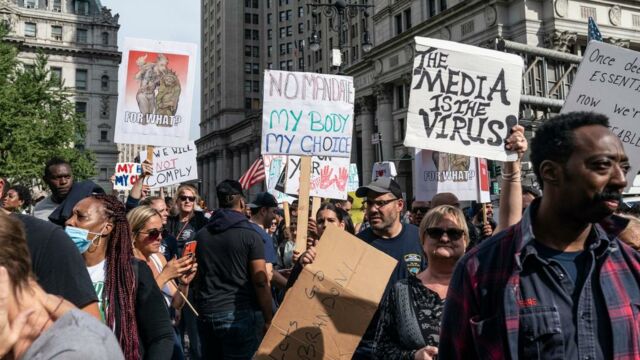It comes as no surprise thatthe COVID-19 pandemic has been met with huge suspicion from conspiracy theorists: many questioning human freedoms, vaccine safety and efficacy, and supposed intentions for governments to control populations.
Discover our latest podcast
But it seems that these suppositions may actually be detrimental to conspiracy theorists’ health as one recent study has shown that these beliefs can result in people being more likely to contract the virus.
Belief in conspiracy theories could affect behaviour
The study published in Psychological Medicine revealed that COVID conspiracy theories can be associated with a believer’s behaviour, making them more likely to violate COVID safety restrictions and turn out a positive coronavirus test.
Researchers also concluded that COVID conspiracy theorists tend to experience worse economic and social situations as well as reduced overall wellbeing.
Even if a conspiracy theory is extremely implausible according to logic or scientific evidence, if it seems real to a perceiver, it has a genuine impact on attitudes, emotions, and behavior.
Already people have seen the effects of COVID conspiracy and anti-vaxx theories, often resulting in peopleturning to dangerous, unproven alternative COVID treatments.
But, although it’s well known thatCOVID conspiracies can lead to the flouting of lockdowns and increased vaccine hesitancy, previous studies haven’t explored the long-term effects on health and wellbeing.
COVID conspiracy theorists are more likely to face social rejection
To answer this, social psychologist Jan-Willem van Prooijen and their team surveyed 5.745 people in the Netherlands in April 2020, asking them to rate their beliefs in common COVID conspiracy theories such as COVID was created as a bio-weapon, as a means of controlling the masses, or as a tool to blame an upcoming economic crash and/or for financial gain.
Participants were then surveyed again eight months later in December 2020, inquiring about their experience during the pandemic, including if they had ever tested positive for the virus or if they’d ever broken any COVID restrictions.
Researchers also questioned if volunteers experienced any job or income loss over the pandemic or if people had cut contact with them over their opinions on the virus.
Results showed that 'conspiracy beliefs are associated with a myriad of negative life outcomes in the long run’, with theorists being more likely to test positive for COVID but overall less likely to opt for testing in the first place.
People who believed in COVID conspiracy theories were also more likely to have had flouted lockdown rules, lost their jobs and been rejected by non-conspiracy believing peers.
However, the study did have its limitations, being that it relied on self-reported surveys and a small cohort. The study was also only able to draw a correlation between COVID conspiracy beliefs and an individual’s outcome, and the causation of the results can merely be speculated.
Despite this, researchers are still confident that ‘conspiracy beliefs predict how well people cope with the challenges of a global pandemic and therefore has substantial implications for private and public health, as well as perceivers' economic and social well-being.’















